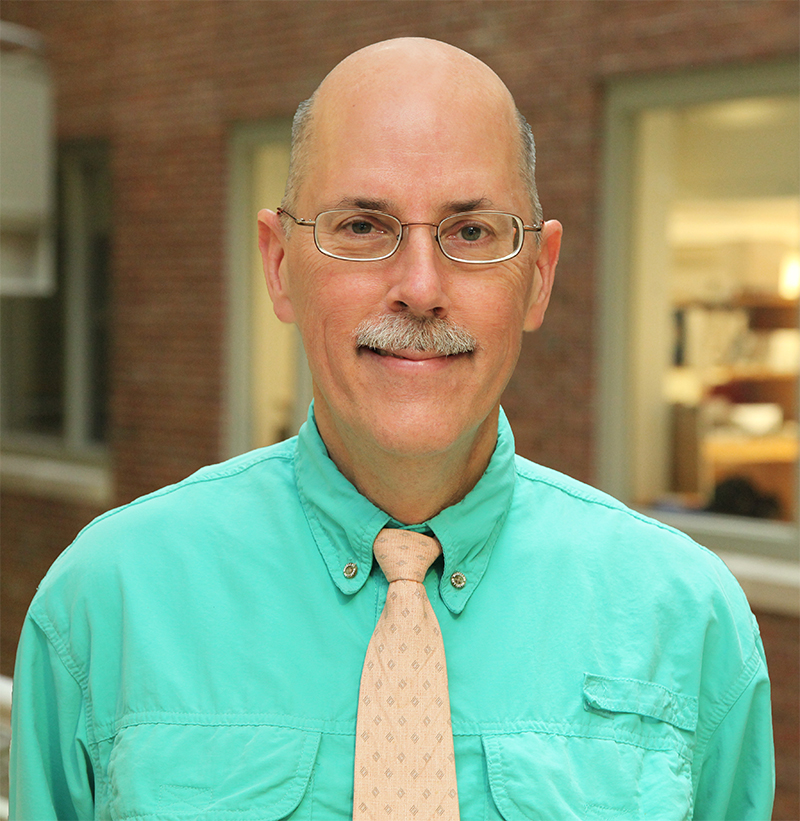
Charles R. Sanders, Ph.D.
Professor of Biochemistry & Medicine
Vice Dean of Basic Sciences
Associate Dean for Research
Aileen M. Lange & Annie Mary Lyle Chair, Cardiovascular Research
- : chuck.sanders@vanderbilt.edu
- : 615-936-3756
- :
5110 C MRB III
465 21st Avenue South
Nashville, - 37232-8725
Structural & chemical biology of disease-related membrane proteins
Name: Sanders, Charles R.
Title: Associate Dean for Research, Professor of Biochemistry, Investigator Center Molecular Neurosciences, Professor of Medicine, Aileen M. Lange & Annie Mary Lyle Chair in Cardiovascular Research
Department: Biochemistry
Office Address: Rm 5110C BIOSCI/MRBIII
Phone Number: (615) 936-3756
E-mail: chuck.sanders@vanderbilt.edu
Lab URL: http://structbio.vanderbilt.edu/sanders
Research Keywords: membrane proteins, disease, Charcot-Marie-Tooth, myelin, folding, misfolding, structural biology, NMR, spectroscopy, receptors, receptor, membrane, protein structure, neurodegenerative, neurodegeneration, enzymes, enzyme action, neuroscience, single nucleotide polymorphisms, SNPs, GPCRs, GPCR, G protein-coupled, Alzheimer’s, neurodegenerative, kidney, potassium channels, KCNE1, integrins, amyloid, channels, biophysics, biochemistry, chemical biology
Research Specialty: Structural and chemical biology of membrane proteins. Membrane protein misfolding and disease. Alzheimer’s disease, Charcot-Marie-Tooth Disease, cardiac arrhythmias, kidney fibrosis
Research Description: Molecular Biophysical Basis of Diseases Related to Membrane Protein Dysfunction and Misfolding A surprising number of diseases are caused or impacted by missense mutations in genes encoding membrane proteins that result in protein dysfunction and/or misfolding and mistrafficking early in the secretory pathway. We seek to elucidate the molecular biophysical mechanisms by which such mutations result in these defects. Our approach is to carry out studies of purified membrane proteins under well-controlled conditions and then correlating observations from these studies with what is known about the behavior of the corresponding mutant protein in vivo. We are pursuing several systems. We have discovered that the amyloid precursor protein (APP) that is closely associated with the development of Alzheimer’s disease binds cholesterol in a way that may help to control production of the amyloid-beta polypeptide. We seek to understand exactly how and why cholesterol binds to APP and by what mechanisms this regulates amyloid-beta production. A second system involves Long QT Syndrome mutant forms of both the human KCNQ1 potassium channel and a modulatory partner, KCNE1. We are unraveling the mechanisms by which mutations in either of these proteins result in serious, even fatal cardiac arrhythmias. Another project involves a protein of the human peripheral nervous system known as peripheral myelin protein 22 (PMP22). PMP22 is known to undergo mutation-prompted misfolding which results in Charcot-Marie-Tooth Disease.
We also study the integrin family or receptors that link the cell to the extracellular matrix, with a particular interest in integrins that are related to kidney function and fibrosis, as commonly occurs in type II diabetes. We also study the interactions of arrestins with G protein-coupled receptors (GPCRs). These studies employ a wide range of techniques spanning the range from molecular biophysics/spectroscopy/biochemistry to cellular/molecular biology. However, solution NMR spectroscopy is the central technique of the lab and the method for which this lab is best known. Additional information is found at the lab web site: http://structbio.vanderbilt.edu/sanders Training in the Sanders Lab Trainees in the Sanders lab are also broadly trained in membrane protein biochemistry and biophysics. This often involves learning practical NMR spectroscopy. Trainees are also encouraged to broaden their horizons even further by interacting closely with, or even carrying out experiments in the labs of our collaborators, who are generally more physiologically-oriented that the Sanders lab. Students are also constantly exhorted to master the literature related to their project and to develop a strong biomedical perspective for their work.
Finally, the PI of this lab believes that is very important for trainees to be taught the ins and outs of the research culture, including funding strategies, peer review service, and how to be a good collaborator and colleague. See, for example the document “What is Expected of a Ph.D. Student or Postdoctoral Fellow in the Sanders Lab?” which can be viewed on-line at: http://structbio.vanderbilt.edu/sanders/Sanders_Lab_Guide_Comprehensive.pdf
PubMed Listing of Dr. Sanders’s Publications